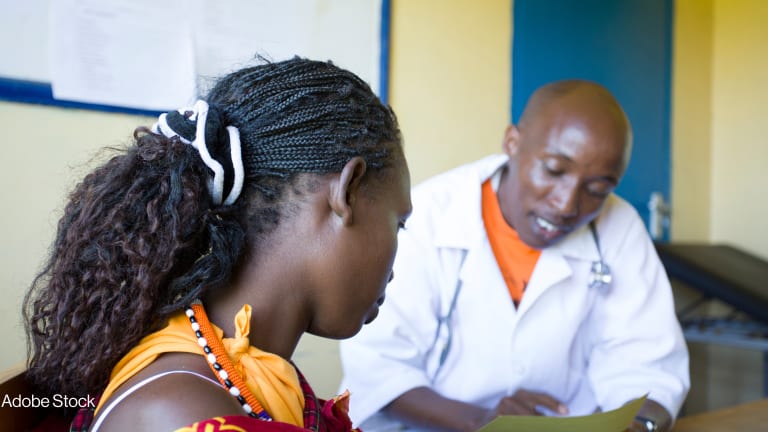
For generations, medical science has been playing catch-up with painful, chronic inflammatory diseases. In most cases, the extent of clinicians’ ambitions has been merely to manage patients’ symptoms. For people with rheumatoid arthritis, psoriasis, inflammatory bowel disease, and other immune-mediated inflammatory conditions, flare-ups were considered inevitable. And discomfort and fatigue were accepted as inescapable realities of a permanently reduced quality of life.
Today, this no longer has to be the case. Modern treatment can now offer people with chronic inflammatory conditions not only symptom mitigation but also the possibility of outright remission of their disease.
We have witnessed this transformation in the treatment of chronic inflammatory conditions firsthand. Unfortunately though, we can see this is still the exception, not the rule, in our respective communities. Too few primary care providers and even specialists today pursue remission for their chronic inflammatory disease patients. And too few patients even know that remission is possible.
This must change. Patients, clinicians, policymakers, and payers, including government departments, private insurers, and individual persons, need to understand — and demand — that the pursuit of remission, once an aspiration, becomes the global standard of care.
The burden of chronic inflammatory conditions
If the value of a medical treatment depends on the suffering it alleviates, then few innovations in the history of medicine can equal the promise of remission. Tens of millions of people around the world — including 5%-7% of the population in Western societies — live with inflammatory conditions, and they are not minor inconveniences — they are exhausting, debilitating, and deeply painful.
Rheumatoid arthritis inflames the joints so badly that patients can struggle to sleep through the night, walk, or even type. Psoriasis produces itching, burning skin lesions. The chronic intestinal swelling from Crohn’s disease and colitis ravages patients’ gastrointestinal tracts, leading to excruciating abdominal cramps. Life with an untreated inflammatory condition is a life of chronic pain, lost productivity and wages, and increasing disability. A 2024 study found that, globally, patients with inflammatory bowel diseases lost 16% of their annual working hours due to health challenges. In 2020, rheumatoid arthritis alone accounted for more than 4.8 million foregone disability-adjusted life years around the world. And a U.S. study found rheumatoid arthritis patients face a 27% higher risk of premature death.
Chronic inflammatory conditions already impose a total social cost — including direct care expenses and indirect costs such as degraded quality of life and lost income — in the hundreds of billions of dollars. And those costs are set to explode in coming decades, as developing societies age and urbanize. By 2050, for example, rheumatoid arthritis’ prevalence is projected to grow by 80% and irritable bowel diseases’ prevalence to double among the elderly population.
A new approach
Patients and clinicians agree: We need a new approach. That is what treat-to-remission care offers patients, clinicians, and health care systems around the world — the elimination of chronic inflammatory disease symptoms and their related personal, social, and economic costs.
Remission from chronic inflammatory conditions improves patient outcomes and quality of life. It means going from chronic pain to greatly reduced pain, and in some cases, no pain. For patients living with rheumatoid arthritis, remission looks like returning to work, picking up a child, or enjoying the outdoors again. These are qualitative benefits for potentially millions of people around the world.
And remission’s measurable benefits, both societal and economic, are just as exciting. Studies of rheumatoid arthritis patients, for instance, found that remission increased their work productivity by 37%-75% while lowering their medical expenses by 19%-52%. Patients in remission have longer life expectancies and lower risks of developing comorbidities, which lightens the load on overburdened health care systems. Similar productivity gains, health benefits and cost savings for patients with other inflammatory conditions would be transformative for national economies and health care systems around the world.
And yet, remission-minded treatment remains out of reach for most patients. That’s not because it doesn’t work, but simply because it isn’t tried. According to a 2020 study, for instance, although 70% of surveyed RA patients endure “high disease activity levels,” only 38% are offered a treatment change. Another study found that remission rates among Australians with inflammatory bowel diseases depend on which clinics the patients visit — suggesting that not all providers share similar treatment strategies and goals based on the best possible patient outcome
Prioritizing remission
In Brussels, November 2023, a roundtable of rheumatologists and patient advocates from around the world issued a simple call to action: make remission the standard of care for inflammatory rheumatic conditions. Their message was clear. The science is here. The medicines are here. All that's missing is the follow-through — as evidenced by several persistent but solvable barriers to remission-oriented care.
Specifically, they noted that too many patients have trouble accessing specialists — especially in the crucial early weeks after the onset of symptoms, when interventions can greatly increase the likelihood of the patient achieving remission. And too few national and community health systems offer multi-disciplinary teams to quickly identify and holistically treat RA patients to eliminate, rather than just mitigate, symptoms.
Global health care systems, they argued, must also make advanced pharmaceuticals, such as biologics, available to inflammatory disease patients. If remission is to be the standard, then patients must have access to treatment options that can deliver it.
One of the main causes of the gap between treatment best practices and real-world patient experiences is the lack of information about remission-oriented care. Patients and physicians both need to know that remission is a realistic treatment goal. Medical training and public health campaigns about the potential for remission — and the urgency of early treatment — can help both groups to make this a reality.
Also, while general practitioners are an indispensable part of promoting and standardizing remission-oriented treatment, they also need the flexibility to help their patients access secondary care quickly when appropriate. Specialized nurses, occupational and physical therapists, and local social support networks should all be integrated into care for patients with inflammatory conditions.
Finally, both general physicians and specialists must have the clinical autonomy to provide remission-oriented treatment based on individual patients’ needs — unrestricted by outdated protocols or red tape.
As policymakers and civil society members gather in Geneva for this year’s World Health Assembly, we are joining together with health care system stakeholders to launch the Global Remission Coalition. The coalition will serve to raise awareness about the benefits of the pursuit of remission through early diagnosis, access to advanced treatments, and holistic care. Remission is possible for many and should be the target for all who live with inflammatory conditions. Now, health care systems need to make the pursuit of remission a priority.
Learn more at www.GlobalRemission.org.










